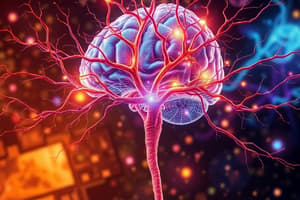Podcast
Questions and Answers
What is the name of the nerve pathway that contains preganglionic fibers traveling to sympathetic trunk ganglia?
What is the name of the nerve pathway that contains preganglionic fibers traveling to sympathetic trunk ganglia?
What is the name of the ganglia located anterior to the vertebral column in the abdomen and pelvis, often found on the aorta?
What is the name of the ganglia located anterior to the vertebral column in the abdomen and pelvis, often found on the aorta?
Which of the following correctly describes the location of preganglionic neuron cell bodies?
Which of the following correctly describes the location of preganglionic neuron cell bodies?
What is the function of the gray ramus communicans?
What is the function of the gray ramus communicans?
Signup and view all the answers
Which of these ganglia are NOT located in the abdomen and pelvis?
Which of these ganglia are NOT located in the abdomen and pelvis?
Signup and view all the answers
What type of neuron cell bodies are found in the sympathetic chain ganglia?
What type of neuron cell bodies are found in the sympathetic chain ganglia?
Signup and view all the answers
Which of the following is NOT a characteristic of the collateral ganglia?
Which of the following is NOT a characteristic of the collateral ganglia?
Signup and view all the answers
Which of the following describes the pathway of a sympathetic preganglionic fiber leaving the thoracolumbar spinal cord?
Which of the following describes the pathway of a sympathetic preganglionic fiber leaving the thoracolumbar spinal cord?
Signup and view all the answers
What is the origin of the pelvic splanchnic nerves?
What is the origin of the pelvic splanchnic nerves?
Signup and view all the answers
Which cranial nerves are involved in the parasympathetic innervation of the head?
Which cranial nerves are involved in the parasympathetic innervation of the head?
Signup and view all the answers
How do parasympathetic fibers from the sacral region reach their target organs?
How do parasympathetic fibers from the sacral region reach their target organs?
Signup and view all the answers
What characterizes the autonomic plexuses?
What characterizes the autonomic plexuses?
Signup and view all the answers
Which of the following statements about the sympathetic division is true?
Which of the following statements about the sympathetic division is true?
Signup and view all the answers
Which of the following describes a characteristic of the sympathetic division?
Which of the following describes a characteristic of the sympathetic division?
Signup and view all the answers
What is the effect of the parasympathetic division on heart rate?
What is the effect of the parasympathetic division on heart rate?
Signup and view all the answers
Where are the cell bodies of the first neurons in the parasympathetic division located?
Where are the cell bodies of the first neurons in the parasympathetic division located?
Signup and view all the answers
What is the structure of the ganglia in the parasympathetic division?
What is the structure of the ganglia in the parasympathetic division?
Signup and view all the answers
Which cranial nerves are associated with cranial outflow in the parasympathetic division?
Which cranial nerves are associated with cranial outflow in the parasympathetic division?
Signup and view all the answers
The sacral outflow of the parasympathetic division mainly innervates which areas?
The sacral outflow of the parasympathetic division mainly innervates which areas?
Signup and view all the answers
What is a primary role of the sympathetic division during emergency situations?
What is a primary role of the sympathetic division during emergency situations?
Signup and view all the answers
Which of the following is NOT a function of the parasympathetic division?
Which of the following is NOT a function of the parasympathetic division?
Signup and view all the answers
What is the primary function of the autonomic nervous system?
What is the primary function of the autonomic nervous system?
Signup and view all the answers
What distinguishes the somatic motor system from the autonomic motor system?
What distinguishes the somatic motor system from the autonomic motor system?
Signup and view all the answers
What is the response associated with the sympathetic division of the autonomic nervous system?
What is the response associated with the sympathetic division of the autonomic nervous system?
Signup and view all the answers
Where does the parasympathetic division of the autonomic nervous system originate?
Where does the parasympathetic division of the autonomic nervous system originate?
Signup and view all the answers
How many motor neurons are involved in the autonomic nervous system pathway?
How many motor neurons are involved in the autonomic nervous system pathway?
Signup and view all the answers
What type of muscle does the autonomic nervous system NOT affect?
What type of muscle does the autonomic nervous system NOT affect?
Signup and view all the answers
Which statement accurately reflects the effects of the sympathetic and parasympathetic divisions?
Which statement accurately reflects the effects of the sympathetic and parasympathetic divisions?
Signup and view all the answers
What is the primary role of the postsynaptic neuron in the autonomic nervous system?
What is the primary role of the postsynaptic neuron in the autonomic nervous system?
Signup and view all the answers
What is the role of the sympathetic pathway in innervating skin structures?
What is the role of the sympathetic pathway in innervating skin structures?
Signup and view all the answers
What differentiates thoracic and lumbar splanchnic nerves from pelvic splanchnic nerves?
What differentiates thoracic and lumbar splanchnic nerves from pelvic splanchnic nerves?
Signup and view all the answers
Where does the axon synapse when passing through the sympathetic trunk?
Where does the axon synapse when passing through the sympathetic trunk?
Signup and view all the answers
What is a common physiological response associated with sympathetic activation?
What is a common physiological response associated with sympathetic activation?
Signup and view all the answers
What is the location of collateral ganglia for sympathetic pathways?
What is the location of collateral ganglia for sympathetic pathways?
Signup and view all the answers
What structures are directly innervated by sympathetic fibers?
What structures are directly innervated by sympathetic fibers?
Signup and view all the answers
What occurs when the body experiences stress and activates the sympathetic nervous system?
What occurs when the body experiences stress and activates the sympathetic nervous system?
Signup and view all the answers
Which function is NOT typically associated with the sympathetic division of the autonomic nervous system?
Which function is NOT typically associated with the sympathetic division of the autonomic nervous system?
Signup and view all the answers
What is the primary function of the sympathetic trunk ganglia?
What is the primary function of the sympathetic trunk ganglia?
Signup and view all the answers
Which nerve has a direct connection to the celiac ganglion?
Which nerve has a direct connection to the celiac ganglion?
Signup and view all the answers
Which of the following regions receives sympathetic innervation from the lumbar splanchnic nerves?
Which of the following regions receives sympathetic innervation from the lumbar splanchnic nerves?
Signup and view all the answers
Where do preganglionic sympathetic fibers typically synapse?
Where do preganglionic sympathetic fibers typically synapse?
Signup and view all the answers
Which structure is primarily associated with the adrenal medulla?
Which structure is primarily associated with the adrenal medulla?
Signup and view all the answers
Which of the following organs does the sympathetic trunk NOT innervate directly?
Which of the following organs does the sympathetic trunk NOT innervate directly?
Signup and view all the answers
What role do the white rami communicantes play in the sympathetic nervous system?
What role do the white rami communicantes play in the sympathetic nervous system?
Signup and view all the answers
Which ganglion is closest to the ribs and innervates thoracic organs?
Which ganglion is closest to the ribs and innervates thoracic organs?
Signup and view all the answers
What structure acts as a hub for sympathetic innervation to the abdominal organs?
What structure acts as a hub for sympathetic innervation to the abdominal organs?
Signup and view all the answers
Which type of nerves predominantly innervate the genitalia and urinary bladder?
Which type of nerves predominantly innervate the genitalia and urinary bladder?
Signup and view all the answers
Study Notes
Autonomic - Visceral Motor System
- The autonomic nervous system is the visceral motor component of the peripheral nervous system (PNS)
- It regulates visceral functions, such as heart rate, blood pressure, digestion, and urination.
- It innervates smooth muscle, cardiac muscle, and glands.
- It uses a two-neuron pathway, a presynaptic (preganglionic) neuron and a postsynaptic (postganglionic) neuron, for control.
- The presynaptic neuron originates in the central nervous system (CNS) or spinal cord.
- The postsynaptic neuron synapses with the target effector at or near the target organ.
Somatic and Autonomic Nervous Systems
- The somatic motor system has only one neuron extending between the CNS and skeletal muscle.
- Autonomic nervous systems have two; a presynaptic and postsynaptic neuron, to reach the target (smooth muscle or glad).
Somatic Motor
- Somatic motor neurons contain one axon and synapse.
Visceral Motor
- Visceral motor nerves contain two axons and two synapses.
- Various cranial nerves, including CN III, VII, IX, and X, mediate visceral muscle movement
Sympathetic and Parasympathetic Divisions
- Sympathetic: "fight or flight" response, originates in the thoracic and lumbar regions of the spinal cord. Its effects are widespread and involve increasing heart rate, increasing blood flow to skeletal muscles and dilating pupils.
- Parasympathetic: "rest and digest" response, originates in the brain stem and sacral regions of the spinal cord. Its effects are more localized and involve slowing heart rate, directing resources to digestion, and constricting pupils.
Sympathetic Division
- Arousal and fear response
- Increases heart rate and breathing rate
- Dilates pupils and airways
- Increases blood flow to skeletal muscles
- Inhibits digestive and urinary tracts functions
Parasympathetic Division
- Conservation of energy state
- Lowers heart rate and breathing rate
- Constricts pupils and airways
- Directs "housekeeping" activities
- Enhances digestive and urinary tracts functions
Important Considerations
- Sympathetic fibers are present in limbs
- Sympathetic fibers in smooth muscle of arteries, veins and glands
- Sympathetic response in cases of fear, excitement and stress
Studying That Suits You
Use AI to generate personalized quizzes and flashcards to suit your learning preferences.
Related Documents
Description
Test your knowledge on the autonomic and somatic motor systems within the peripheral nervous system. This quiz covers key functions, neuron pathways, and the differences between visceral and somatic motor control. Perfect for biology students looking to deepen their understanding of these essential components of human physiology.



